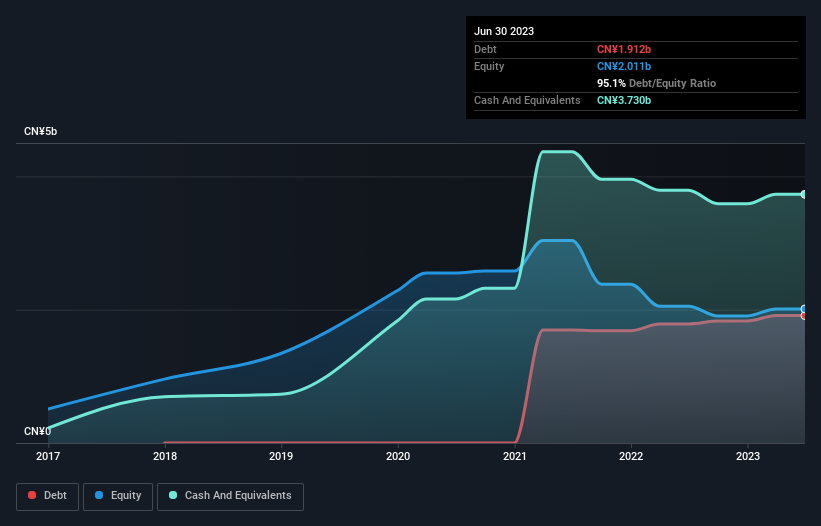Warren Buffett famously said, 'Volatility is far from synonymous with risk.' So it might be obvious that you need to consider debt, when you think about how risky any given stock is, because too much debt can sink a company. We can see that XD Inc. (HKG:2400) does use debt in its business. But is this debt a concern to shareholders?
When Is Debt A Problem?
Debt assists a business until the business has trouble paying it off, either with new capital or with free cash flow. In the worst case scenario, a company can go bankrupt if it cannot pay its creditors. However, a more frequent (but still costly) occurrence is where a company must issue shares at bargain-basement prices, permanently diluting shareholders, just to shore up its balance sheet. Of course, debt can be an important tool in businesses, particularly capital heavy businesses. When we think about a company's use of debt, we first look at cash and debt together.
Check out our latest analysis for XD
What Is XD's Net Debt?
You can click the graphic below for the historical numbers, but it shows that as of June 2023 XD had CN¥1.91b of debt, an increase on CN¥1.79b, over one year. But on the other hand it also has CN¥3.73b in cash, leading to a CN¥1.82b net cash position.

How Strong Is XD's Balance Sheet?
We can see from the most recent balance sheet that XD had liabilities of CN¥2.62b falling due within a year, and liabilities of CN¥177.2m due beyond that. On the other hand, it had cash of CN¥3.73b and CN¥252.7m worth of receivables due within a year. So it actually has CN¥1.19b more liquid assets than total liabilities.
It's good to see that XD has plenty of liquidity on its balance sheet, suggesting conservative management of liabilities. Due to its strong net asset position, it is not likely to face issues with its lenders. Simply put, the fact that XD has more cash than debt is arguably a good indication that it can manage its debt safely. When analysing debt levels, the balance sheet is the obvious place to start. But it is future earnings, more than anything, that will determine XD's ability to maintain a healthy balance sheet going forward. So if you're focused on the future you can check out this free report showing analyst profit forecasts.
Over 12 months, XD reported revenue of CN¥3.6b, which is a gain of 23%, although it did not report any earnings before interest and tax. With any luck the company will be able to grow its way to profitability.
So How Risky Is XD?
By their very nature companies that are losing money are more risky than those with a long history of profitability. And the fact is that over the last twelve months XD lost money at the earnings before interest and tax (EBIT) line. And over the same period it saw negative free cash outflow of CN¥65m and booked a CN¥77m accounting loss. With only CN¥1.82b on the balance sheet, it would appear that its going to need to raise capital again soon. XD's revenue growth shone bright over the last year, so it may well be in a position to turn a profit in due course. By investing before those profits, shareholders take on more risk in the hope of bigger rewards. For riskier companies like XD I always like to keep an eye on whether insiders are buying or selling. So click here if you want to find out for yourself.
At the end of the day, it's often better to focus on companies that are free from net debt. You can access our special list of such companies (all with a track record of profit growth). It's free.
New: AI Stock Screener & Alerts
Our new AI Stock Screener scans the market every day to uncover opportunities.
• Dividend Powerhouses (3%+ Yield)
• Undervalued Small Caps with Insider Buying
• High growth Tech and AI Companies
Or build your own from over 50 metrics.
Have feedback on this article? Concerned about the content? Get in touch with us directly. Alternatively, email editorial-team (at) simplywallst.com.
This article by Simply Wall St is general in nature. We provide commentary based on historical data and analyst forecasts only using an unbiased methodology and our articles are not intended to be financial advice. It does not constitute a recommendation to buy or sell any stock, and does not take account of your objectives, or your financial situation. We aim to bring you long-term focused analysis driven by fundamental data. Note that our analysis may not factor in the latest price-sensitive company announcements or qualitative material. Simply Wall St has no position in any stocks mentioned.
About SEHK:2400
XD
An investment holding company, develops, publishes, operates, and distributes mobile and web games in Mainland China and internationally.
Outstanding track record with flawless balance sheet.
Market Insights
Weekly Picks


Crazy Undervalued 42 Baggers Silver Play (Active & Running Mine)


Fiducian: Compliance Clouds or Value Opportunity?

Willamette Valley Vineyards (WVVI): Not-So-Great Value
Recently Updated Narratives

Moderation and Stabilisation: HOLD: Fair Price based on a 4-year Cycle is $12.08


Positioned globally, partnered locally


When will fraudsters be investigated in depth. Fraud was ongoing in France too.
Popular Narratives


MicroVision will explode future revenue by 380.37% with a vision towards success


NVDA: Expanding AI Demand Will Drive Major Data Center Investments Through 2026





